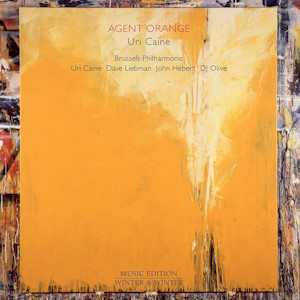
Uri Caine (b. 1956)
Agent Orange – Piece in ten sections for orchestra and four improvisers (2017)
Uri Caine (piano); Dave Liebman (saxophone); John Hebert (double bass); DJ Olive (electronics)
Brussels Philharmonic/Alexander Hanson
rec. live, 2018, Brussels, Belgium
Winter & Winter W&W 910 286-2 [45]
Uri Caine was born in Philadelphia and Wikipedia identifies him as a “classical and jazz pianist and composer”. The same source tells us that Caine has recorded 16 “mostly classical” albums. He steps freely between jazz and classical and probably does not recognise these musical binaries. His homage to Gustav Mahler received an award from the German Mahler Society. (There are three works of his related to Mahler). He has also freely re-engineered variations by Beethoven (Diabelli) and Bach (Goldberg) and has dwelt on and delved creatively into music by Wagner, Schumann and Mozart.
The ten titled movements of Agent Orange are separately tracked but are played without pause. There are no sung or orated words here: no singing, no speakers. The title refers to Agent Orange sprayed from airplanes to destroy green growth in the jungles of Vietnam between 1961 and 1971. The music also ranges far wider than that to warn and to portray feelings provoked by upheaval and violence in the USA from 1968 onwards. The music demonstrates ceaseless change and incessant steps to embrace the listener’s heart.
Premonitions is the first section and has the Furies gibbering and “let slip the dogs of war”. It is as if a refulgent Rousseau-like jungle has become vindictively animated: “the mome raths outgrabe”. The composer’s piano is active amid a Messiaen-like whirl of activity. Screeching electronics are wildly unleashed and the saxophone screams out in passion and torment. The writing is passionate, lush and feral with solo violin and xylophone in the mix. The effect, all in all, is like some flailing and moaning Rabelaisian giant (Gargantua and Pantagruel).
The Agent Orange movement (2) wildly tips and tumbles. The Separation Of The Children (3) warbles and whoops as in the 1950s score for the Tempest-inspired film Forbidden Planet. There’s a plaintive but very masculine saxophone in the mix. Fine People On Both Sides (4) suggests gently amused laughter cascading in gushing waterfalls. Upside-Down Bible has Liebman’s wildly cavorting saxophone, more electronics and what sounds like a baby’s rattle. Coursing ‘chasseur’ piano figuration dominates Bleach Blues (6) which hurls gauntlet-challenges to the saxophone. In Take A Break (7) we find Verklärte Nacht-style string writing which muses, ferments, boils, bubbles and heaves. Next, saxophone and piano re-enter and sustain and then break the spell. This is a most romantic movement. The next movement (8) disorientates the listener with an American Civil War medley of song tunes. Caine is back next with sax and piano and frenetic brass interrogatories which also weave in those Civil War tunes. The finale is a suitably uncertain (An Uncertain Fate) but there is some contented delight here as well. This is a live performance so the recording includes applause at the end and the engineers have done an admirable job with the vivid sound given that it was taken down ‘on the fly’.
There are brief notes by Uri Caine in French, German and English. I would have liked to have read more from Caine and would like to hear more of Caine’s music.
Rob Barnett
Help us financially by purchasing from




















